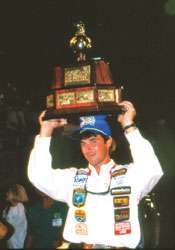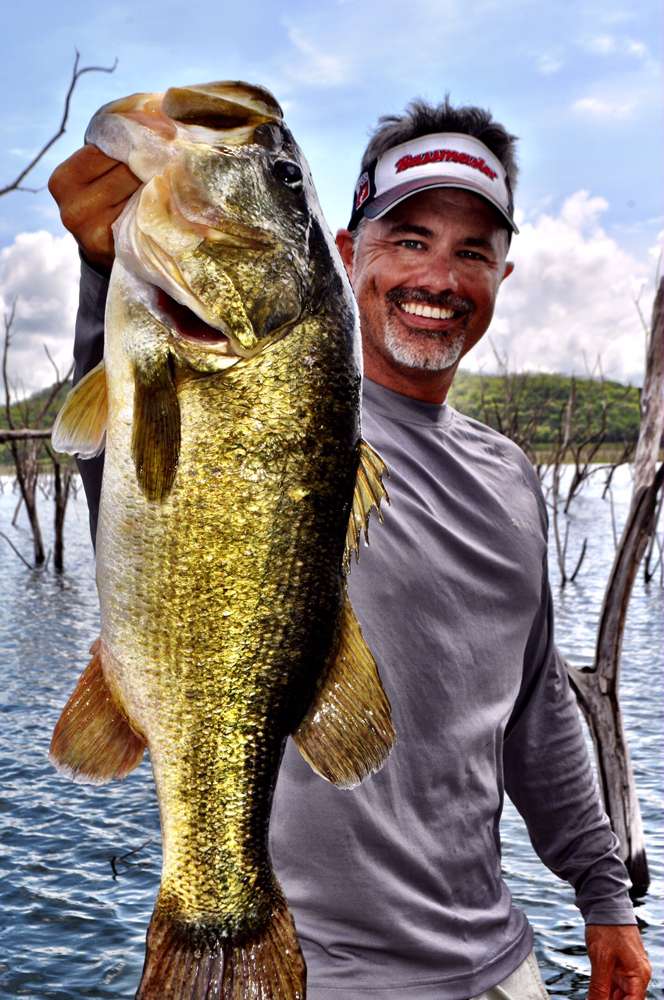
Bass fishing as you know it today would be a much different recreation had Ray Scott not dreamed up the concept of the Bass Anglers Sportsman Society in 1968. Our fisheries likely would be nasty, our access to lakes likely would be very limited, our bass populations likely would be slender, and our gear likely would be archaic in comparison to what we use today.
Although paring down the very long list of accomplishments and happenings over the 40 years BASS has existed was a very difficult task, I have given it a shot. As a member of BASS, read the following timeline with a sense of pride. No matter the date stamped on your membership card, you are associated with what BASS has accomplished over the years on behalf of bass anglers and fisheries conservation. And fish soundly knowing that this timeline is far from complete.
1968: The Chattanooga Bass Club becomes the first to affiliate with the B.A.S.S. Federation Nation, formed to address water pollution at the grass-roots level. The move also adds 19 anglers to a BASS membership consisting of only Oklahoman Don Butler. The Federation Nation is now over 20,000 strong and is the backbone of national grass-roots efforts nationwide to promote and sustain bass fishing and fisheries.
1968: Bassmaster Magazine is created to help funnel bass fishing knowledge from the best anglers in the world to the recreational fisherman. By the end of the year, 2,000 anglers would subscribe to the magazine. Now with a circulation of over 500,000 and a readership topping the 3 million mark, Bassmaster is the largest fishing magazine in the world.
1970: The BASS conservation movement begins when 250 water polluting companies are taken to court for violating the Federal Refuse Acts of 1899. Conservation remains at the forefront of the BASS mission statement, with a full-time staff devoted to dealing with the issues through the Federation Nation network.
1970: Bill Dance wins the first BASS Angler of the Year title and receives only a plaque for the accomplishment. Today, the Toyota Tundra Bassmaster Elite Series Angler of the Year wins $250,000.
1971: A jetliner leaves Atlanta on Oct. 28 with 24 anglers for the first Bassmaster Classic, destination unknown. The plane reaches cruising altitude, and Scott announces the destination is Las Vegas. At Lake Mead, Bobby Murray wins the first Classic and its $10,000 prize purse. The "mystery flights" end in 1977 to accommodate a growing fan following. Elite Series pro Alton Jones accepted a $500,000 check for winning the 2008 Classic.
1972: After contenders catch over a ton of bass from Sam Rayburn at the Texas National BASS Tournament, BASS launches its "Don't Kill Your Catch" campaign out of concern for the future and conserving bass populations. Innovative pros rig crude aerator systems fashioned from garden hoses and sprinklers to conform to the new catch-and-release rule. Eventually, all bass boat manufacturers incorporate a livewell as standard equipment based on this new BASS initiative.
1984: With mixed support from the marine industry, BASS lobbies successfully for the Wallop-Breaux Amendment to expand the federal Dingell-Johnson Act. Since its enactment, the amendment has channeled tens of millions of dollars to states annually for sportfishing projects, such as building boat ramps and enhancing fisheries.
1984: Rick Clunn wins his third Classic title on the Arkansas River. Clunn set the standing record for Classic winning weight with 75 pounds, 9 ounces, with then-Vice President George Bush and then-Arkansas Gov. Bill Clinton on hand to weigh in the winning catch. Clunn would go on to win his fourth Classic in 1990, setting a BASS record for number of championships.
1989: BASS Times, the newsletter for BASS club members, is transformed into a tabloid newspaper offering "News & How-To Information for the Serious Bass Fisherman." The publication provides comprehensive tournament coverage and environmental news and has become a favorite among pros and die-hard bass anglers.
1991: Concerned by the decline in youth fishing, BASS holds a trial CastingKids contest. Seventeen years later, the Bassmaster CastingKids program has impacted more than 1.6 million youths, with annual events held nationwide by the Federation Nation.
1994: Connecticut angler Bryan Kerchal, a member of the Housatonic Bassmasters, becomes the first Federation Nation angler to win the Classic. He died just five months later in a commuter airplane crash.
2001: ESPN, the worldwide leader in sports, acquires BASS as the cornerstone for its new ESPN Outdoors initiative. The following year, the Classic would air live on cable giant ESPN.
2004: BASS creates the Junior World Championship, the climax of regional and state youth bass fishing events qualifying two age divisions (11 to 14 and 15 to 18). The champions receive a total of $23,000 in scholarships.
2006: BASS ushers in a new age in competitive angling with the creation of the Elite Series. The concept of putting the best anglers in the world on the best bodies of water during the best time of year paid off with all-time records broken the first event of the year. Since then, 24 anglers have bested the 100-pound mark during a four-day tourney.
2008: Bassmaster Classic champion Alton Jones and Women's Bassmaster Tour champion Judy Wong are invited to the White House to visit President Bush. While in the Oval Office in front of the national media contingent, Bush states, "There's nothing better than fishing. It's a sport that requires good conservation in order to make sure our fisheries are good."

